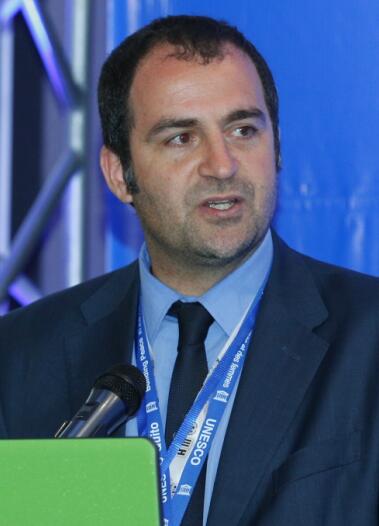


Committed to Sustainable Cities and Human Settlements for All

In Special Consultative Status with ECOSOC
Search
NameDescriptionContent
Home>>Text
Karim Hendili: The Role of Culture in Sustainable Urban Development
Source:
|
Author:gfhsforum
|
Published time: 2017-01-11
|
1049 Views
|
Share:

Karim Hendili, Culture Sector Programme Specialist, UNESCO
Today, more than half of the world’s population lives in an urban environment. We are facing several challenges, including the preservation of people’s identity and memory. So it’s important to value the local cultures and to promote the cultural expressions in their diversity, the arts and heritage.
The UN General Assembly, by its Resolution 66/208 of 2011 on “Culture and Development”, acknowledged the fact that culture is an important factor of social inclusion and poverty eradication, as well as a vector of economic growth. Placing culture at the heart of the process which defines development policies is henceforth considered as a key condition to the sustainability of the actions undertaken in favor of human development. Cities invest more and more in culture as a key economic engine and social development vector.
In some cases, major cultural projects have become the symbol of these cities. In Bilbao (Spain), where the Guggenheim museum has become the flagship of the urban revitalization programme at the end of the 1980’s, launched after the economic crisis.
Heritage can play a very important role in the economic development of cities notably through tourism but not only through tourism. The 2030 Agenda acknowledges the integral role of culture across many SDGs, but significantly, culture is directly addressed in Goal 11 which aims to “make cities and human settlements inclusive, safe, resilient and sustainable”. Specifically in target 11.4: “Strengthening efforts to protect and safeguard the world’s cultural and natural heritage”.
“Cities are the main entry point for culture”. Culture is key to what makes cities attractive, creative and sustainable. History has shown that culture is at the heart of urban development.
On 18 October, UNESCO officially launched in Quito its Global Report on Culture for Sustainable Urban Development. This report explores the role of culture in sustainable urban development and aims to become a policy framework document to support national and local governments in the implementation of the 2030 Agenda for Sustainable Urban Development as well as the New Urban Agenda.
Culture has the power to make cities more prosperous places safe and sustainable, according to the World Culture Report: Urban Future. The report shows that the implementation of development policies that take into account the protection and promotion of culture and heritage, as advocated by the UNESCO conventions, benefits the cities.
The report also identifies some innovative strategies used to promote the preservation of historic housing, essential areas to maintain the identity and well -being of communities. For example, in Quito (Ecuador), public subsidies were given to the inhabitants of residential buildings of the historic center with a view to restoring, keeping residents in their original neighborhoods and thus prevent residential gentrification, or "gentrification".
The role of creative industries to spur economic growth in the long term also appears in the report, which illustrates the case of Shanghai (China), member of the Creative Cities Network of UNESCO since 2010. The city is now one of the major creative centers of the world, and more than 7.4% of its population working in the creative industries sector.
Among the main recommendations of the Report include measures to: recognize and promote cultural diversity of cities, integrating culture into strategies to counter urban violence, invest to include culture in urban planning and include cultural heritage and creativity in the urban approach.
As Irina Bokova, Director-General of UNESCO said,“Culture lies at the heart of urban renewal and innovation. This Report provides a wealth of insights and concrete evidence showing the power of culture as a strategic asset for creating cities that are more inclusive, creative and sustainable.’’
People-centred cities are culture-centered spaces.
Quality urban environments are shaped by culture.
Sustainable cities need integrated policy-making that builds on culture.
The UN General Assembly, by its Resolution 66/208 of 2011 on “Culture and Development”, acknowledged the fact that culture is an important factor of social inclusion and poverty eradication, as well as a vector of economic growth. Placing culture at the heart of the process which defines development policies is henceforth considered as a key condition to the sustainability of the actions undertaken in favor of human development. Cities invest more and more in culture as a key economic engine and social development vector.
In some cases, major cultural projects have become the symbol of these cities. In Bilbao (Spain), where the Guggenheim museum has become the flagship of the urban revitalization programme at the end of the 1980’s, launched after the economic crisis.
Heritage can play a very important role in the economic development of cities notably through tourism but not only through tourism. The 2030 Agenda acknowledges the integral role of culture across many SDGs, but significantly, culture is directly addressed in Goal 11 which aims to “make cities and human settlements inclusive, safe, resilient and sustainable”. Specifically in target 11.4: “Strengthening efforts to protect and safeguard the world’s cultural and natural heritage”.
“Cities are the main entry point for culture”. Culture is key to what makes cities attractive, creative and sustainable. History has shown that culture is at the heart of urban development.
On 18 October, UNESCO officially launched in Quito its Global Report on Culture for Sustainable Urban Development. This report explores the role of culture in sustainable urban development and aims to become a policy framework document to support national and local governments in the implementation of the 2030 Agenda for Sustainable Urban Development as well as the New Urban Agenda.
Culture has the power to make cities more prosperous places safe and sustainable, according to the World Culture Report: Urban Future. The report shows that the implementation of development policies that take into account the protection and promotion of culture and heritage, as advocated by the UNESCO conventions, benefits the cities.
The report also identifies some innovative strategies used to promote the preservation of historic housing, essential areas to maintain the identity and well -being of communities. For example, in Quito (Ecuador), public subsidies were given to the inhabitants of residential buildings of the historic center with a view to restoring, keeping residents in their original neighborhoods and thus prevent residential gentrification, or "gentrification".
The role of creative industries to spur economic growth in the long term also appears in the report, which illustrates the case of Shanghai (China), member of the Creative Cities Network of UNESCO since 2010. The city is now one of the major creative centers of the world, and more than 7.4% of its population working in the creative industries sector.
Among the main recommendations of the Report include measures to: recognize and promote cultural diversity of cities, integrating culture into strategies to counter urban violence, invest to include culture in urban planning and include cultural heritage and creativity in the urban approach.
As Irina Bokova, Director-General of UNESCO said,“Culture lies at the heart of urban renewal and innovation. This Report provides a wealth of insights and concrete evidence showing the power of culture as a strategic asset for creating cities that are more inclusive, creative and sustainable.’’
People-centred cities are culture-centered spaces.
Quality urban environments are shaped by culture.
Sustainable cities need integrated policy-making that builds on culture.
Copyright © Global Forum on Human Settlements (GFHS)
